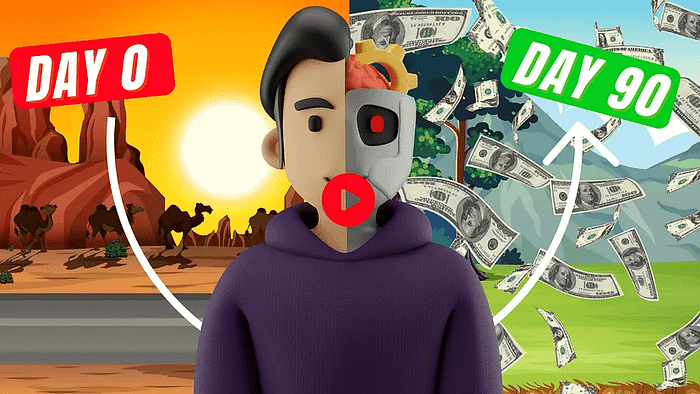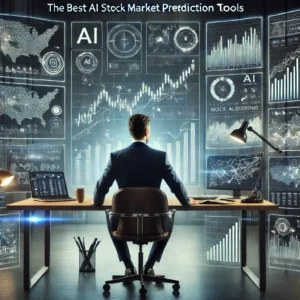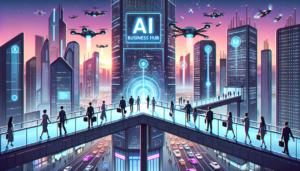10 Irreplaceable Careers: Jobs That AI Can’t Replace in the Digital Age
Introduction: The Human Edge in a World of Algorithms
Robots and smart machines may be taking over many tasks, but there are still jobs that AI can’t replace.
As technology advances at breakneck speed, many wonder about the future of work.
Will machines take over everything?
The good news is that there are plenty of careers where human skills remain irreplaceable.
These jobs that AI can’t replace rely on uniquely human abilities like creativity, empathy, and complex problem-solving.
In this article, we’ll explore ten career paths that are likely to remain in human hands for the foreseeable future.
We’ll dig into why these jobs are resistant to automation and what makes them special.
We strongly recommend that you check out our guide on how to take advantage of AI in today’s passive income economy.
Table of Contents
The Rise of AI and Its Impact on the Job Market
Artificial intelligence has come a long way in recent years.
It can now perform many tasks that were once thought to be uniquely human.
From driving cars to writing articles, AI is making its mark in various industries.
This rapid progress has led to concerns about job displacement and the future of work.
Many fear that robots and algorithms will eventually replace human workers entirely.
However, the reality is more nuanced than these doomsday predictions suggest.
While AI will certainly change the job market, it won’t eliminate the need for human workers.
Instead, it will likely create new opportunities and reshape existing roles.
The Importance of Human Skills in the Digital Age
As we navigate this changing landscape, it’s crucial to understand the value of human skills.
There are many things that humans can do that machines simply can’t match.
Empathy, creativity, and complex decision-making are just a few examples.
These skills are at the heart of jobs that AI can’t replace.
They require a level of emotional intelligence and nuanced understanding that AI lacks.
By focusing on these uniquely human abilities, we can future-proof our careers.
We can ensure that we remain valuable and irreplaceable in the workplace.
Let’s explore ten career paths that showcase these essential human skills.
1. Mental Health Professionals: Healing Minds with Human Empathy
In a world increasingly dominated by technology, mental health professionals stand out as irreplaceable.
These experts, including therapists, counselors, and psychiatrists, provide crucial support for emotional well-being.
Their work relies heavily on empathy, active listening, and human connection – qualities that AI can’t replicate.
Mental health professionals must interpret subtle cues in body language, tone, and context.
They need to build trust and rapport with their clients, something that requires genuine human interaction.
While AI can assist with some aspects of mental health care, it can’t replace the human touch.
The nuanced understanding and emotional support provided by these professionals make their jobs secure.
As society becomes more aware of mental health issues, demand for these services is likely to grow.
2. Creative Directors: Visionaries in a World of Data
Creative directors are the masterminds behind advertising campaigns, product designs, and artistic visions.
Their role requires a unique blend of creativity, strategic thinking, and leadership skills.
These professionals must understand cultural trends, consumer psychology, and brand identity.
They need to come up with fresh, innovative ideas that resonate with audiences.
While AI can analyze data and generate content, it can’t match human creativity and intuition.
Creative directors must think outside the box and take calculated risks – abilities that AI lacks.
They also need to lead and inspire teams, another aspect that requires human touch.
As businesses strive to stand out in a crowded marketplace, creative directors will remain indispensable.
3. Teachers and Educators: Shaping Minds and Futures
Education is another field where human skills are irreplaceable.
Teachers do more than just impart knowledge – they inspire, mentor, and guide their students.
They adapt their teaching methods to suit different learning styles and individual needs.
Educators must create engaging lesson plans, manage classroom dynamics, and provide emotional support.
While AI can assist with certain aspects of education, it can’t replace the human connection.
Teachers build relationships with their students, understanding their strengths and weaknesses.
They provide personalized attention and encouragement that can shape a student’s future.
As education evolves, the role of teachers will likely change, but it won’t become obsolete.
4. Social Workers: Advocates for Human Welfare
Social workers play a crucial role in supporting vulnerable individuals and communities.
Their job requires a deep understanding of human behavior, social systems, and policy.
Social workers must navigate complex situations, often dealing with sensitive issues.
They need to build trust with their clients and advocate for their needs effectively.
While AI can help with data analysis and resource allocation, it can’t replace human judgment.
Social workers often make critical decisions that require empathy and ethical considerations.
They also need to coordinate with various stakeholders and adapt to changing circumstances.
As society faces ongoing challenges, the demand for skilled social workers is likely to increase.
5. Lawyers and Legal Professionals: Navigating the Complexities of Law
The legal profession is another area where human skills remain irreplaceable.
Lawyers must interpret complex laws, argue cases, and provide strategic advice to clients.
They need to understand nuances in language, context, and human behavior.
Legal professionals must also adapt to changing laws and societal norms.
While AI can assist with legal research and document review, it can’t replace human judgment.
Lawyers need to think creatively to find solutions to unique legal challenges.
They also need to build relationships with clients, judges, and other legal professionals.
As laws become more complex, the need for skilled legal professionals will continue to grow.
6. Nurses and Healthcare Providers: The Human Touch in Healing
In the healthcare industry, nurses and other providers play an irreplaceable role.
These professionals provide hands-on care, emotional support, and critical decision-making.
They need to interpret symptoms, respond to emergencies, and coordinate patient care.
Nurses must also communicate effectively with patients, families, and other healthcare team members.
While AI can assist with diagnostics and data analysis, it can’t replace human care and compassion.
Healthcare providers need to show empathy, provide comfort, and build trust with patients.
They also need to adapt quickly to changing situations and make complex ethical decisions.
As healthcare needs evolve, the demand for skilled nurses and providers will remain strong.
7. Human Resources Managers: Nurturing Talent and Company Culture
Human resources managers play a crucial role in shaping organizational culture and managing talent.
They need to understand human behavior, motivations, and interpersonal dynamics.
HR professionals must recruit suitable candidates, manage conflicts, and develop employee potential.
They also need to navigate complex legal and ethical issues related to employment.
While AI can help with certain HR tasks, it can’t replace human judgment and empathy.
HR managers need to build relationships, mediate disputes, and foster a positive work environment.
They also need to adapt to changing workforce trends and company needs.
As organizations recognize the importance of company culture, HR roles will remain vital.
8. Entrepreneurs and Business Leaders: Visionaries of Innovation
Entrepreneurs and business leaders are at the forefront of innovation and economic growth.
These individuals need to identify opportunities, take calculated risks, and inspire others.
They must navigate complex business landscapes and make strategic decisions.
Entrepreneurs need to be adaptable, resilient, and creative in the face of challenges.
While AI can provide data and analysis, it can’t replace human vision and leadership.
Business leaders need to build relationships, negotiate deals, and motivate teams.
They also need to understand market trends and consumer behavior on a deep level.
As the business world continues to evolve, the role of visionary leaders will remain crucial.
9. Artists and Performers: Expressing the Human Experience
Artists and performers hold a special place among jobs that AI can’t replace.
These creative individuals express emotions, tell stories, and challenge societal norms through their work.
They need to tap into deep wells of creativity and human experience.
Artists must also interpret and respond to cultural trends and social issues.
While AI can generate art and music, it can’t replicate human creativity and emotional depth.
Artists and performers need to connect with their audience on an emotional level.
They also need to push boundaries and explore new forms of expression.
As society seeks meaning and connection, the role of artists will remain irreplaceable.
10. Ethical AI Specialists: Guiding the Future of Technology
As AI becomes more prevalent, the need for ethical AI specialists is growing.
These professionals ensure that AI systems are developed and used responsibly.
They need to understand both technology and its potential impacts on society.
Ethical AI specialists must navigate complex ethical dilemmas and policy issues.
While AI can assist in data analysis, it can’t make ethical judgments or policy decisions.
These specialists need to collaborate with diverse stakeholders and communicate complex ideas clearly.
They also need to anticipate potential problems and develop proactive solutions.
As AI continues to advance, the role of ethical AI specialists will become increasingly crucial.
Conclusion: Embracing Our Humanity in the Digital Age
As we’ve explored, there are many jobs that AI can’t replace in the foreseeable future.
These careers all rely on uniquely human skills like empathy, creativity, and complex decision-making.
While AI will certainly change the job market, it won’t eliminate the need for human workers.
Instead, it will likely create new opportunities and reshape existing roles.
By focusing on developing our human skills, we can future-proof our careers.
We can ensure that we remain valuable and irreplaceable in the workplace.
The key is to embrace our humanity and the unique abilities it gives us.
By doing so, we can thrive alongside AI rather than being replaced by it.
The Future of Work: Humans and AI Working Together
As we look to the future, it’s clear that the most successful approach will involve collaboration.
Humans and AI working together can achieve more than either could alone.
AI can handle routine tasks and data analysis, freeing humans to focus on higher-level thinking.
This partnership can lead to increased productivity and innovation across industries.
Jobs that AI can’t replace will likely evolve to incorporate AI as a tool.
Professionals in these fields will need to learn how to work effectively with AI systems.
This will require ongoing learning and adaptation as technology continues to advance.
By embracing this collaborative approach, we can create a future of work that benefits everyone.
Preparing for the Future: Developing Irreplaceable Skills
To thrive in this changing landscape, it’s crucial to focus on developing irreplaceable skills.
These include emotional intelligence, creativity, critical thinking, and adaptability.
Continuous learning and professional development will be key to staying relevant.
We should also focus on building strong interpersonal skills and networks.
While technical skills are important, it’s the human skills that will set us apart.
By cultivating these abilities, we can ensure our place in jobs that AI can’t replace.
We can position ourselves as valuable assets in any industry or role.
The future belongs to those who can combine human insight with technological prowess.
Frequently Asked Questions:
Which job cannot be replaced by AI?
While no job is entirely immune to AI influence, several careers are highly resistant to full automation:
- Mental health professionals
- Creative directors
- Teachers and educators
- Social workers
- Lawyers and legal professionals
These jobs require complex human skills like empathy, creativity, and nuanced decision-making that AI currently cannot replicate.
Human judgment and emotional intelligence are crucial in these roles, making them among the jobs that AI can’t replace easily.
What jobs will be safe from AI?
Jobs that rely heavily on human interaction, emotional intelligence, and complex problem-solving are likely to be safe from AI:
- Healthcare providers, especially nurses
- Human resources managers
- Entrepreneurs and business leaders
- Artists and performers
- Ethical AI specialists
These careers involve skills that are uniquely human, such as building relationships, showing empathy, and making ethical decisions.
While AI may assist in these fields, it’s unlikely to fully replace human workers in these roles.
What jobs are the most likely to be automated?
Jobs that involve repetitive tasks or data processing are more susceptible to automation:
- Data entry clerks
- Telemarketers
- Bookkeepers and accounting clerks
- Assembly line workers
- Bank tellers
These roles often involve routine, predictable tasks that can be efficiently performed by AI and robotic systems.
However, it’s important to note that automation may change these jobs rather than eliminate them entirely.
What jobs will be gone by 2030?
While it’s difficult to predict with certainty, some jobs may become obsolete or significantly transformed by 2030:
- Travel agents
- Cashiers
- Postal workers
- Print journalists
- Taxi drivers
These predictions are based on current trends in technology and consumer behavior.
However, new jobs will likely emerge to replace those that become obsolete, and many existing roles will evolve rather than disappear completely.
It’s crucial to remember that while some jobs may be at risk, there will always be a need for human skills in the workforce.
Adaptability and continuous learning will be key to navigating these changes in the job market.

We strongly recommend that you check out our guide on how to take advantage of AI in today’s passive income economy.




